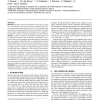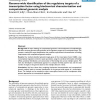142 search results - page 15 / 29 » Reconstruction of Ancestral Genomic Sequences Using Likeliho... |
BIBE
2003
IEEE
15 years 5 months ago
2003
IEEE
Abstract— We analyze the performance of likelihoodbased approaches used to reconstruct phylogenetic trees. Unlike other techniques such as Neighbor-Joining (NJ) and Maximum Parsi...
BIOINFORMATICS
2007
14 years 12 months ago
2007
Motivation: Genome maps are fundamental to the study of an organism and essential in the process of genome sequencing which in turn provides the ultimate map of the genome. The in...
BMCBI
2010
14 years 12 months ago
2010
Background: Phylogenetic relationships between genes are not only of theoretical interest: they enable us to learn about human genes through the experimental work on their relativ...
106
click to vote
BMCBI
2005
14 years 11 months ago
2005
Background: A major challenge in computational genomics is the development of methodologies that allow accurate genome-wide prediction of the regulatory targets of a transcription...
123
click to vote
BMCBI
2011
14 years 6 months ago
2011
Background: The Monte Carlo simulation of sequence evolution is routinely used to assess the performance of phylogenetic inference methods and sequence alignment algorithms. Progr...


